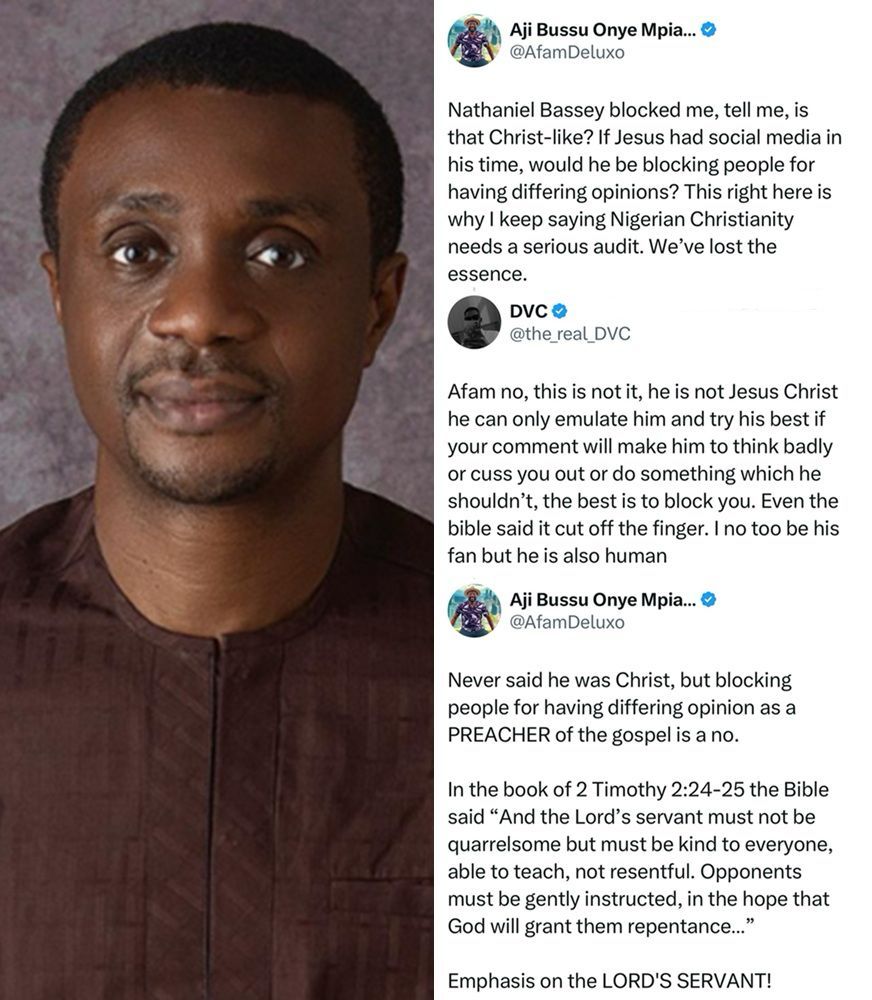
"Blocked in the Name of the Lord?": Nathaniel Bassey Sparks Controversy After Social Media Move

The gospel music scene in Nigeria has found itself at the center of a fiery online debate this week, all thanks to a single tap of the block button by one of its most beloved figures. Nathaniel Bassey, the internationally acclaimed gospel singer known for soul-lifting songs like Imela and Onaga, is currently trending—but not for his music. Rather, he's under scrutiny after reportedly blocking a social media user who questioned some of his views, igniting conversations about spiritual leadership, accountability, and what it really means to be Christ-like in the digital age.
The incident began when a user with the handle @AfamDeluxo, popularly known for his sharp-witted commentary and Twitter presence under the name “Aji Bussu Onye Mpia,” posted a tweet that quickly went viral: “Nathaniel Bassey blocked me, tell me, is that Christ-like? If Jesus had social media in his time, would he be blocking people for having differing opinions? This right here is why I keep saying Nigerian Christianity needs a serious audit. We've lost the essence.”
The tweet struck a chord with thousands, gaining traction among Nigerians who are no strangers to calling out church leaders and religious figures for perceived hypocrisy or a lack of accountability. It also raised an age-old question, now reframed for the digital era: how much grace should a man of God exhibit online, and when does personal boundary-setting cross into un-Christlike behavior?
Supporters of Bassey were quick to jump to his defense. One user, @therealDVC, responded directly to Afam’s tweet, stating, “Afam no, this is not it. He is not Jesus Christ. He can only emulate him and try his best. If your comment will make him think badly or cuss you out or do something which he shouldn't, the best is to block you. Even the Bible said it—cut off the finger.”
The response reflects a growing sentiment among some Nigerian Christians that spiritual leaders, though held to high standards, are still human and must sometimes take actions to guard their peace and mental well-being—especially in the toxic space that social media can often be. But that explanation didn’t sit well with everyone.
Afam doubled down on his position, clarifying that he never expected perfection from the gospel singer, but found it troubling that someone whose entire career centers around ministering to people could shut the door on dissent. “Never said he was Christ,” Afam wrote in a follow-up post, “but blocking people for having differing opinion as a PREACHER of the gospel is a no.”
He didn’t stop there. Quoting scripture to back his stance, Afam referenced 2 Timothy 2:24-25: “And the Lord’s servant must not be quarrelsome but must be kind to everyone, able to teach, not resentful. Opponents must be gently instructed…” He stressed the phrase “Lord’s servant,” arguing that figures like Bassey carry a moral obligation to respond to criticism with patience and love, not the click of a block button.
The debate has since evolved from a personal disagreement to a national discourse, with many weighing in on what it truly means to reflect Christ in the age of Twitter threads and Instagram comments. Some argue that public figures, even spiritual ones, should be allowed the same digital boundaries everyone else has. Others say the calling of a minister demands higher tolerance for criticism, even when it feels personal or harsh.
This isn’t the first time Nigerian social media has taken a preacher or gospel figure to task. From prosperity pastors flaunting wealth in the midst of poverty to church leaders engaging in political discourse, the intersection of faith and public scrutiny is a recurring theme. However, what makes this particular controversy so striking is how it has brought a routine online action—blocking—into theological debate.
Is clicking “block” a form of modern-day excommunication? Is it a denial of an opportunity to minister to someone who may need it the most? Or is it a reasonable, human decision in a world where mental health is increasingly under siege? For some, the fact that the person doing the blocking is not just a celebrity but a messenger of the gospel makes the issue weightier.
Still, others have called for perspective, pointing out that Nathaniel Bassey has a massive following, and likely deals with an avalanche of messages and mentions daily. Not all of them are positive. Some are confrontational, abusive, or simply draining. For such public figures, blocking may not be about avoiding correction but about filtering noise to focus on their calling.
One user put it plainly: “If he blocks 10 people so he can stay sane and bless 10,000 others, isn’t that a net win?” But critics argue that the very essence of the gospel is engagement, grace, and the willingness to meet people where they are—even if that place is a slightly antagonistic Twitter thread.
As the conversation rages on, Nathaniel Bassey himself has remained silent, offering no public comment on the situation. Some fans have praised his silence as wise and mature, while others see it as evasion. Either way, the silence is deafening and has only fueled the speculation and debate even more.
What this saga has exposed is not just a clash between a fan and a famous gospel artist—it has peeled back the layers of how faith is lived out in the digital world. It has shown how Twitter has become not just a platform for news and humor, but a modern pulpit where believers, doubters, and critics hash out theology in real time.
For now, Nathaniel Bassey’s block button remains a symbol—of boundaries for some, of contradiction for others. But beyond the heat of the debate lies a deeper truth: the Nigerian church is evolving, and with it, the expectations we place on those who lead it. Whether or not you think blocking is “Christ-like,” one thing is certain—the conversation is far from over.


